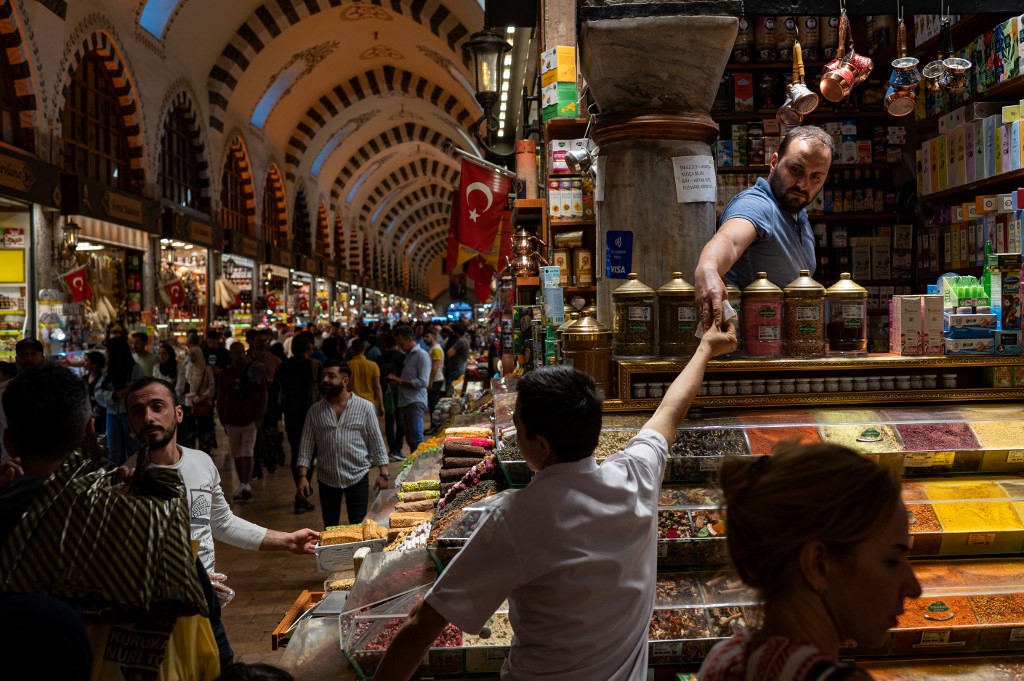Turkey’s annual rate of inflation slowed for a second month in December after previously hitting a two-decade high, Agence France-Presse reported, citing official data released on Tuesday.
The news is expected to boost President Recep Tayyip Erdoğan’s chances in elections due in June.
The state statistics office said consumer prices rose 64.3 percent in December from a year earlier, compared to an 84.4 percent increase in November.
Analysts attribute the sharp slowdown to the so-called base effect, which makes year-on-year price increases appear smaller when compared with extremely high levels 12 months earlier.
The latest figure is still higher than in any other emerging market except Argentina.
But it fulfills Erdoğan’s campaign promise that inflation would fall at the start of the year, after reaching its highest level since 1998 last year.
Economy Minister Nureddin Nebati blamed last year’s record inflation rates on “difficult conditions around the world” and promised a better future.
“In the coming months, all our citizens will feel the cumulative impact of our anti-inflation measures even more,” he tweeted after the data was released.
Spending splurge
Turkey’s economy has been in turmoil since Erdoğan launched an unusual experiment in September 2021 to fight inflation by lowering borrowing costs.
The lira began losing value almost immediately as consumers rushed to buy gold and dollars to protect their savings.
Prices for imports such as oil and gas skyrocketed, setting off an inflationary spiral that the nominally independent central bank fueled further by cutting interest rates even more.
The annual inflation rate peaked at 85.5 percent in October 2022.
However, polls show that most Turks have lost confidence in the official data after Erdoğan replaced the head of the state statistics agency following a particularly dire inflation report last year.
A separate survey by Turkey’s ENAG research institute showed annual inflation slowed to 137.6 percent in December from 170.7 percent the previous month.
The economic crisis forced Erdoğan to change his foreign policy. He resumed economic alliances with petrodollar-rich rivals in the Arab world and intensified trade with Russia, despite its war against Ukraine.
These deals helped boost Turkey’s hard currency reserves, which enabled it to stabilize the lira.
The government also forced exporters to convert 40 percent of their dollar revenues into lira, which further supported the Turkish currency.
‘Very difficult outlook’
The stabilization of the lira has helped to curb the pace of price increases.
Analysts warn, however, that a wave of populist social support measures announced by Erdoğan before the election will make current economic policies unsustainable.
In the past year, he has tripled the minimum wage, increased state salaries and raised pensions for millions of Turks.
Analysts believe these measures will cost the state billions of dollars, strain the budget and fuel inflation.
It is all part of Erdogan’s re-election strategy but whoever wins by June, the accounting for this will be very painful. Turkey faces a very difficult economic outlook after elections, because of the current disastrous policy mix. https://t.co/0kHJOhVTwA
— Timothy Ash (@tashecon) January 2, 2023
“Turkey faces a very difficult economic outlook after elections, because of the current disastrous policy mix,” tweeted Timothy Ash of BlueBay Asset Management.
Erdoğan has vowed not to raise the benchmark interest rate, which at 9 percent is only a fraction of the annual inflation rate.

